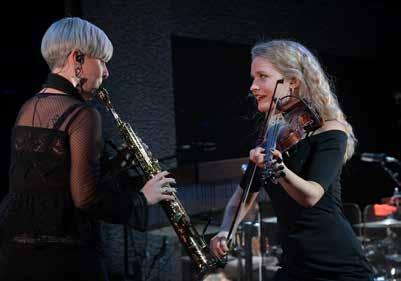
3 minute read
Looking Back, Looking Ahead
Martin Luther King Jr. gave his famous ‘I Have a Dream’ speech in 1963 – a year of magnitude for many reasons nationally and internationally, but closer to home, it is also a year of great influence. During this 2022-23 academic year, the university recognizes this significant milestone: the 60th anniversary of Black student life at UNCW.
In the fall of the 1962-63 academic year, Marshall Collins and Ernest Fullwood were the first Black students to enroll in Wilmington College, following a handshake agreement between civil rights activist Dr. Hubert Eaton and Wilmington College President John Hoggard to integrate the college.
Advertisement
In recognition of six decades of desegregation, Wayne Dunlap ’80, who served as the first Black student body president and Black Student Union president, and Tishera Owens ’24, the current Black Student Union president, share their thoughts about their hopes for the future.
Prior to 1962, African Americans were not allowed to attend the College Road campus of Wilmington College, which became UNCW in 1969. Until then, Black students attended classes at the Williston Campus. Notably, the quality of life for Black students has changed dramatically in the 60 years since Ernest Fullwood and Marshall Collins desegregated the university. Many factors have contributed to those changes. Most significantly, I think, has been the Upperman African American Cultural Center. The Upperman Center opened in 1995, approximately 16 years after I graduated. It has become the nucleus for Black student activities, an incubator for new student clubs and organizations, and the strongest link between the university and the Black community in Wilmington. Because of the Upperman Center, today’s students see Afrocentric activities such as cultural excursions, exhibits, films, lecture series and social events as routine to college life. Black students have a physical space on campus to call their own – a place where they are mentored and supported, and where their academic and personal development is fostered.

Looking back, I am reminded that Wantu Wazuri (“Beautiful People”), founded in 1970, was a forerunner of the BSU and the first Black student organization at UNCW. The present status of Black student life is their legacy. And while present and future Black Seahawks will chart the course for the next 60 years, I am hopeful their vision includes a greater percentage of African American students, a more diverse faculty, higher graduation rates and more students moving on to top-tier graduate programs and career opportunities. Most of all, I imagine future scholars graduating with greater confidence and a sense of self than when they arrived.
I currently serve as the president of the Black Student Union. I have held many roles on the Executive Board of BSU during my time here as a student over the past three years.
I want to express my thoughts as a traditional Black student at a predominantly white institution and not just as the Black Student Union’s president.
As UNCW celebrates 60 years of Black life, it is a significant milestone for my community. I describe this milestone as a time of reflection and appreciation. The Upperman African American Cultural Center’s theme this school year is “A is for Activism,” and I have been able to reflect on what it took for my community to reach 60 years of Black student life. Triumphs in UNCW Black history include the first Black graduate on campus (Ernest Fulwood ’66), the first Black woman graduate Lela Thompson ’67, the first Black Student Union president Wayne Dunlap ’80 and the creation of the Upperman African American Cultural Center (1995). Struggles that students before us faced include racism, microaggression and not feeling welcomed by white counterparts on campus. As a Black student, hearing about the things Black students had to endure at the same campus I am on is tragic but inspiring. Their courage and perseverance make me appreciate being on this campus because they have paved the way for me and other students who look like me to be here at UNCW.
My hope for the next 60 years of Black student life is that students continue to pave the way for other Black students on campus. I hope the Black community continues to be unified and supportive towards one another. I believe that Black students have a unique bond, which I hope grows in the future.










